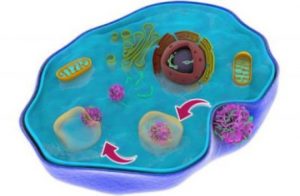
Schematic representation of the movement of the flower-like particle as it makes its way through a cellular trap to deliver therapeutic genes. Credit: WSU
According to ScienceDaily, researchers have developed a new method to deliver drugs and therapies into cells at the nanoscale level.
What makes this new approach particularly promising is that it does not lead to toxic side effects, unlike other similar efforts attempted by researchers. The problem frequently faced was in the delivery of the therapeutic genes into cells, the nanomaterials only showing low delivery efficiency of medicine and possible toxicity.
The Washington State University (WSU) research team was able to overcome that hurdle. Led by Yuehe Lin, WSU School of Mechanical and Materials Engineering professor, and Chunlong Chen, senior scientist at the Department of Energy’s Pacific Northwest National Laboratory, the group successfully developed biologically inspired materials at the nanoscale that were able to deliver model therapeutic genes into tumor cells effectively.
“The nanoflowers successfully and rapidly escaped (the cell trap) and exhibited minimal cytotoxicity,” says Lin, who hopes to eventually conduct further studies using real medicines.
“This paves a new way for us to develop nanocargoes that can efficiently deliver drug molecules into the cell and offers new opportunities for targeted gene therapies,” says Lin.
In support of the advancement of nanotechnology, ECS offers two awards to recognize individuals who have made outstanding contributions to the field.
The Nanocarbons Division Richard E. Smalley Research Award and Nanocarbons Division Robert C. Haddon Research Award recognize those who’ve made outstanding contributions to the science of fullerenes, nanotubes, and carbon nanostructures.

